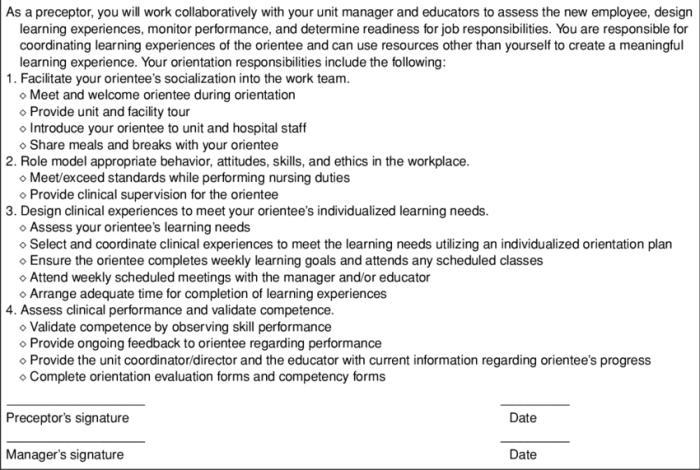As organizations strive to onboard and retain top talent, a preceptor is assigned to work with a new employee, serving as a crucial guide and mentor. This practice fosters a supportive and empowering work environment that benefits both the new employee and the organization as a whole.
Preceptors play a multifaceted role in the professional development of new employees, providing guidance, support, and feedback that accelerate their learning and integration into the workplace. Their expertise and experience create a valuable resource for new employees, enabling them to navigate the complexities of their new role and the organization’s culture.
Overview of Preceptor Assignment

Preceptor assignment is a common practice in many industries to support the onboarding and development of new employees. A preceptor is an experienced employee who is assigned to guide, support, and mentor a new employee during their initial period of employment.
The purpose of preceptor assignment is to facilitate the smooth transition of new employees into the organization, enhance their learning and development, and ensure their success in their new roles. Preceptors provide invaluable support by sharing their knowledge, skills, and expertise with new employees, helping them to adapt to the organization’s culture, processes, and expectations.
Benefits of having a preceptor extend to both the new employee and the organization. New employees benefit from personalized guidance, mentorship, and support, which can accelerate their learning and skill development. Organizations benefit from improved employee retention, increased productivity, and a more efficient onboarding process.
Selection and Qualifications of Preceptors

Effective preceptors are carefully selected based on specific criteria that ensure they possess the necessary knowledge, skills, and qualities to support the development of new employees. These criteria typically include:
- Strong technical expertise and in-depth knowledge of the organization’s processes and procedures
- Excellent communication and interpersonal skills, with the ability to effectively convey information and provide constructive feedback
- Patience, empathy, and a genuine desire to help others succeed
- A positive attitude, enthusiasm for their work, and a commitment to professional development
Preceptor training and development are crucial to ensure that preceptors are equipped with the necessary skills and knowledge to effectively support new employees. Training programs typically cover topics such as effective communication, mentoring techniques, and evaluation methods.
Roles and Responsibilities of Preceptors
Preceptors play a multifaceted role in supporting the development of new employees. Their key responsibilities include:
- Providing guidance and mentorship to new employees, helping them to navigate the organization and its processes
- Sharing their knowledge and expertise, ensuring that new employees develop the necessary skills and competencies
- Providing constructive feedback and support, helping new employees to identify areas for improvement and develop strategies for success
- Monitoring the progress of new employees and providing regular updates to management
- Advocating for new employees, ensuring that they have the resources and support they need to succeed
Preceptor-New Employee Relationship
The relationship between a preceptor and a new employee is critical to the success of the preceptor assignment. An ideal relationship is characterized by:
- Open communication, with both parties feeling comfortable sharing ideas, concerns, and feedback
- Trust and mutual respect, with both parties valuing each other’s contributions and perspectives
- A shared commitment to the new employee’s development and success
Effective communication is essential for building a strong preceptor-new employee relationship. Preceptors should be approachable and responsive, and they should make time for regular meetings and check-ins with new employees. New employees should feel comfortable asking questions and seeking guidance from their preceptors.
Evaluation and Monitoring of Preceptor Assignments: A Preceptor Is Assigned To Work With A New Employee
Regular evaluation and monitoring are essential to ensure the effectiveness of preceptor assignments. Evaluations can be conducted through a variety of methods, such as:
- Feedback from new employees
- Observation of preceptor-new employee interactions
- Review of preceptor training and development records
Based on the evaluation findings, organizations can make adjustments to their preceptor program to improve its effectiveness. Best practices for monitoring and providing feedback on preceptor performance include:
- Regular meetings between preceptors and supervisors to discuss progress and identify areas for improvement
- Feedback from new employees on the quality of support they are receiving from their preceptors
- Observation of preceptor-new employee interactions to assess communication, mentoring skills, and feedback provision
Best Practices for Preceptor Programs

Successful preceptor programs are built on a foundation of best practices that ensure the quality and effectiveness of the program. These best practices include:
- Clear definition of the roles and responsibilities of preceptors and new employees
- Rigorous selection and training of preceptors
- Regular evaluation and monitoring of preceptor assignments
- Provision of ongoing support and development opportunities for preceptors
- Feedback mechanisms to gather input from new employees and preceptors
Organizations that implement these best practices are more likely to have successful preceptor programs that support the onboarding and development of new employees.
Challenges and Solutions in Preceptor Assignments

Preceptor assignments can face a number of challenges, including:
- Time constraints: Preceptors may have limited time to dedicate to mentoring new employees due to their own workload.
- Lack of training: Preceptors may not receive adequate training on effective mentoring techniques.
- Unrealistic expectations: New employees may have unrealistic expectations of what their preceptors can provide.
- Personality conflicts: Personality conflicts between preceptors and new employees can hinder the effectiveness of the assignment.
Solutions to these challenges include:
- Providing preceptors with protected time for mentoring
- Investing in preceptor training and development
- Managing expectations through clear communication
- Addressing personality conflicts promptly and professionally
Question Bank
What are the key benefits of a preceptor program for new employees?
Preceptor programs provide numerous benefits for new employees, including accelerated learning, improved job performance, increased confidence, and enhanced integration into the workplace.
What are the essential qualities of an effective preceptor?
Effective preceptors possess strong communication skills, empathy, patience, and a deep understanding of the organization’s culture and values.
How can organizations ensure the success of their preceptor programs?
Organizations can enhance the success of their preceptor programs by providing comprehensive training, establishing clear guidelines and expectations, and fostering a culture of support and collaboration.